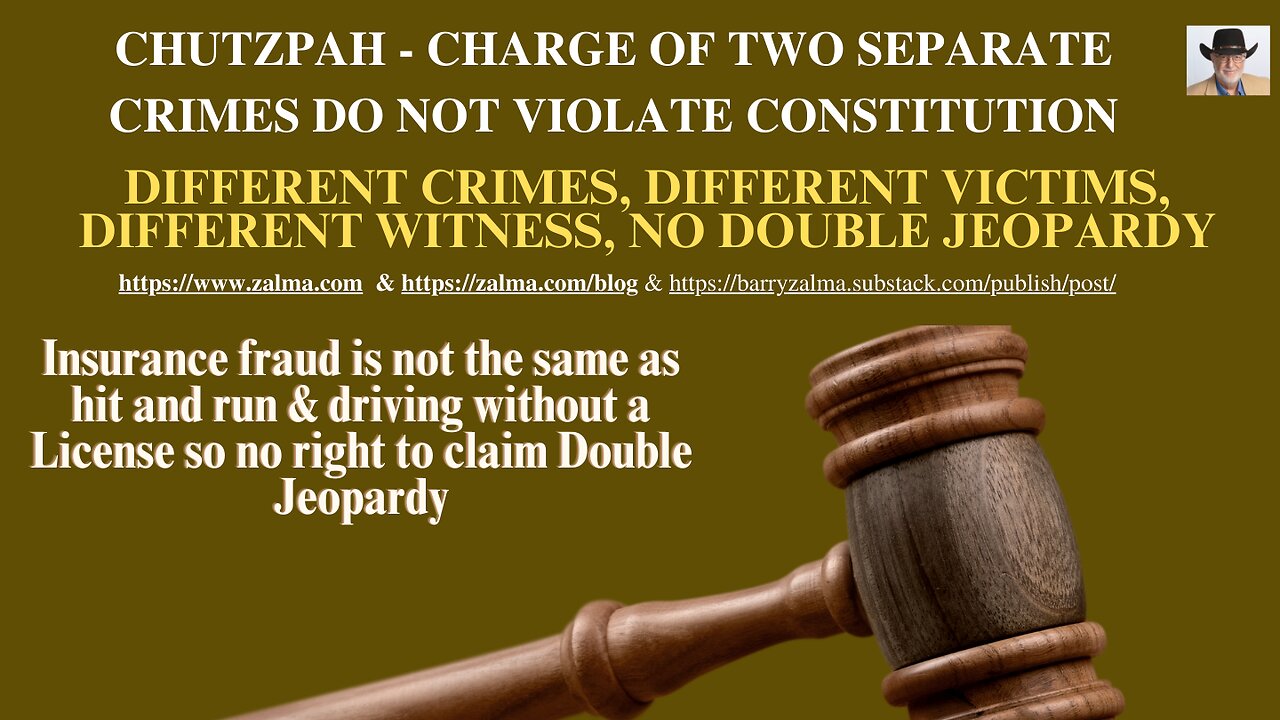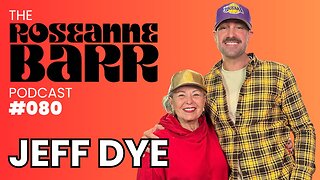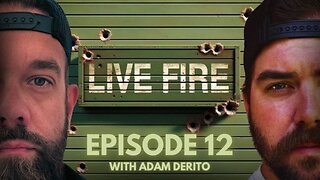Premium Only Content

CHUTZPAH - CHARGE OF TWO SEPARATE CRIMES DO NOT VIOLATE CONSTITUTION
Different Crimes, Different Victims, Different Witness, No Double Jeopardy
Post 4753
Gregory Sewell appealed the order that denied his motion to dismiss based upon double jeopardy. In Commonwealth Of Pennsylvania v. Gregory Sewell, No. 1497 MDA 2022, No. J-S27016-23, Superior Court of Pennsylvania (February 27, 2024) the Pennsylvania court resolved the dispute.
FACTS
On April 2, 2021, a vehicle operated by Sandra Ramirez was struck by a driver who left the scene without exchanging information or rendering aid. In investigating Ms. Ramirez's emergency call, Hanover Police Officer Zachariah Lloyd identified Sewell, who had a suspended license, as the driver of the other vehicle and obtained his insurance policy information. Officer Lloyd discovered that on June 15, 2021, Sewell informed his insurance adjuster in a recorded call that Sewell had been the victim of the hit-and-run by a speeding police vehicle and that he had waited at the scene for more than half an hour after calling the police, who never arrived.
The Commonwealth charged Sewell with insurance fraud and with accidents involving death or personal injury, duty to give information and render aid, duties at stop sign, drivers required to be licensed, and unlawful activities. The latter case terminated when Sewell pled guilty on August 25, 2022, to driving while his operating privilege was suspended.
Sewell thereafter filed a motion to dismiss the current case on double jeopardy grounds, asserting that the insurance fraud prosecution arose from the same criminal episode as the one that culminated in his guilty plea such that it was subject to the compulsory joinder statute.
ANALYSIS
Sewell's counsel filed a petition to withdraw. The court denied counsel's petition and ordered the parties to file new briefs since there was a possibility that the double jeopardy argument might be successful.
The question of whether a defendant's constitutional right against double jeopardy would be infringed by a successive prosecution is a question of law.
A criminal episode is an occurrence or connected series of occurrences and developments which may be viewed as distinctive and apart although part of a larger or more comprehensive series.
A mere de minimis duplication of factual and legal issues is insufficient to establish a logical relationship between offenses. Rather what is required is a substantial duplication of issues of law and fact. Two separate offenses may constitute the same criminal episode if one offense is a necessary step toward the accomplishment of a given criminal objective or if additional offenses occur because of an attempt to secure the benefit of a previous offense or conceal its commission.
As the District Attorney's Office was investigating the first case, that investigation led to the charges in the second case. The District Attorney's Office investigated the accident further and discovered that Sewell allegedly lied on a recorded phone call to his insurance adjuster. Although the second event of the alleged fraud stems from the initial hit-and-run incident, the court concluded that it simply creates a "de minimis" connection.
Sewell pled guilty to a summary charge of driving while operating privilege is suspended while the current case is graded as a felony to prove its case for false/fraudulent insurance claim. To prove insurance fraud the Commonwealth needs to show that Sewell knowingly and with the intent to defraud any insurer filed a claim that contains any false, incomplete or misleading information concerning any fact or thing material to the claim. There is no overlap in the elements of the law because the first case Sewell pled guilty to driving a motor vehicle while his license was suspended, revoked, or cancelled and before those driving rights were restored.
Analyzing the totality of the circumstances in this case, this court found that there were two separate criminal episodes. The crimes themselves, namely driving under suspension and insurance fraud, have no common elements or logical connection.
The cases have different victims, different affiants, and occurred in different places on different days. The trial court properly held that the relationship between Sewell's hitting another vehicle and driving away while his driver's license was suspended on the one hand, and his decision to call his insurance company months later and claim that someone else damaged his vehicle on the other, was not so substantial that they amounted to a single criminal episode. The order was affirmed.
ZALMA OPINION
There is little similarity between a hit-and-run accident and a false insurance claim months later for the damage caused by the hit-and-run. Driving without a license is a crime in Pennsylvania, especially when causing damage and injury to others. Insurance fraud is a lie told to an insurance company with the intent of causing the insurer to pay a claim it does not owe. They are separate crimes with separate evidence. The fact that the damage for Sewell's false insurance claim came from the hit and run does not change the fact of a different crime.
(c) 2024 Barry Zalma & ClaimSchool, Inc.
Please tell your friends and colleagues about this blog and the videos and let them subscribe to the blog and the videos.
Subscribe to my substack at https://barryzalma.substack.com/publish/post/107007808
Go to Newsbreak.com https://www.newsbreak.com/@c/1653419?s=01
Go to X @bzalma; Go to the podcast Zalma On Insurance at; Go to Barry Zalma videos at Rumble.com at https://rumble.com/c/c-262921; Go to Barry Zalma on YouTube- https://www.youtube.com/channel/UCysiZklEtxZsSF9DfC0Expg.
Go to the Insurance Claims Library – https://lnkd.in/gwEYk
-
 4:23:49
4:23:49
FreshandFit
9 hours agoIsrael v Palestine Debate! Respect A Man If He Says No Or Yes To A Girl's Trip?
118K135 -
 2:05:33
2:05:33
TheSaltyCracker
11 hours agoTech Bros try to Hijack MAGA ReeEEeE Stream 12-27-24
218K425 -
 2:01:25
2:01:25
Roseanne Barr
16 hours ago $33.85 earnedJeff Dye | The Roseanne Barr Podcast #80
112K61 -
 7:32
7:32
CoachTY
13 hours ago $10.01 earnedWHALES ARE BUYING AND RETAIL IS SELLING. THIS IS WHY PEOPLE STAY BROKE!!!
76.7K8 -
 1:01:00
1:01:00
Talk Nerdy 2 Us
10 hours ago💻 From ransomware to global regulations, the digital battlefield is heating up!
29.7K -
 3:00:24
3:00:24
I_Came_With_Fire_Podcast
12 hours agoHalf the Gov. goes MISSING, Trump day 1 Plans, IC finally tells the Truth, Jesus was NOT Palestinian
60.4K28 -
 4:11:49
4:11:49
Nerdrotic
15 hours ago $37.75 earnedThe Best and Worst of 2024! Sony Blames Fans | Batman DELAYED | Nosferatu! |Friday Night Tights 334
186K32 -
 7:55:51
7:55:51
Dr Disrespect
19 hours ago🔴LIVE - DR DISRESPECT - WARZONE - SHOTTY BOYS ATTACK
233K32 -
 1:30:23
1:30:23
Twins Pod
18 hours agoHe Went From MARCHING With BLM To Shaking Hands With TRUMP! | Twins Pod - Episode 45 - Amir Odom
145K31 -
 1:02:30
1:02:30
Exploring With Nug
20 hours ago $4.33 earned2 Duck Hunters Missing After Kayak Capsizes!
68.9K4